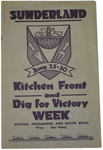Collection highlights
Our display is made up of objects from the Tyne and Wear Archives and Museums collection. These objects represent how people used to live more sustainably, and how people in modern society can reduce their impact on our environment. We have picked out a few of our favourite objects from the exhibition to show you how they inspired our eco-challenges. To see the other objects from our display, head to the Discovery Museum to see the Friendly Footprints exhibition.
|
|
‘Dig for Victory’ programme & recipe book
|
Sewing kits like this were used during the “Make Do and Mend” campaign throughout the Second World War, and these skills are making a comeback. The Haberdashery Department at John Lewis saw a rise of 17% in sales between August 2008 and August 2009, including yarns, wools, craft materials, buttons and sewing machines.
See how this inspired Beth’s eco-challenge…
Light bulbs can last up to 12 times longer than their inefficient counterparts. You can cut energy wastage by over 75% by using an energy-efficient light bulb rather than an inefficient alternative. That produces a saving of up to £9 a year for a typical 100w bulb, or over £100 over the bulb’s lifetime.
See how this inspired Dan’s Eco-challenge…
The Wombles was an entertaining children’s television programme which tried to get across the message of recycling to a younger generation. Children were encouraged to be like the Wombles and “make good use of bad rubbish!”.
See what ‘waste not, want not’ can mean today…
 Kitchen “Dig for Victory” official programme and recipe book
Kitchen “Dig for Victory” official programme and recipe book
During the Second World War people had to grow their own food to supplement their diet, because of food rationing. Recently there has been an increase in the popularity of allotments, with the waiting times for allotments in Camden reaching a 40-year high. In Newcastle the number of people waiting for an allotment more than doubled between 2008 and 2009, so get in there fast!
See how this inspired Anna, Helen and Sheila’s eco-challenges…
Past...
In the past, electrical appliances were made to last. They were normally repaired and reused rather than replaced. It takes up to 500 years for the plastic in a radio to decompose |
Since the iPod was launched on October 23rd 2001, more than 20 different models have been released. Over 200,000 iPods and mp3 players were thrown away last year. These will take centuries to biodegrade. |
footprints@ncl.ac.uk ©University of Newcastle Date March 2010





 iPod
iPod